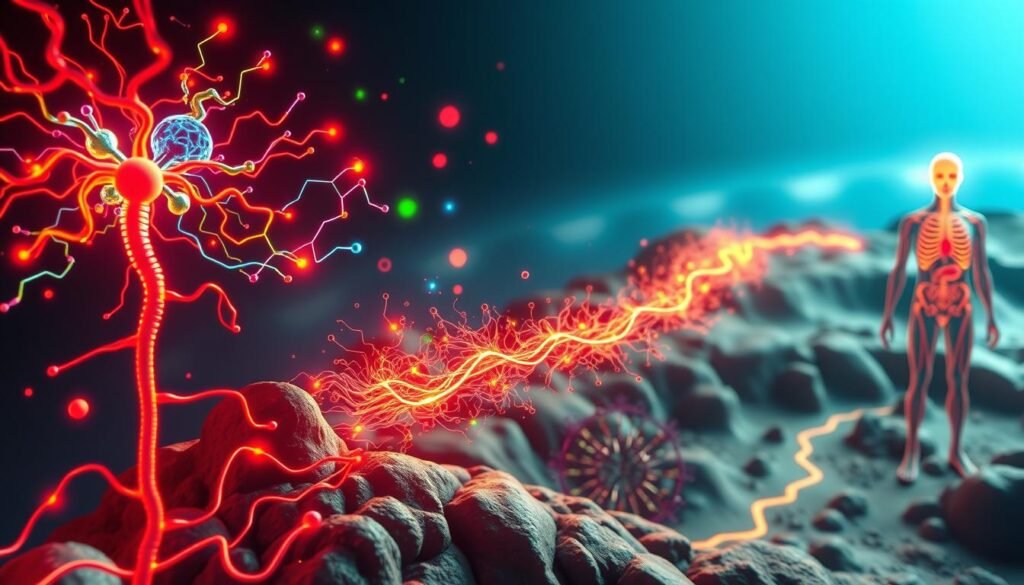For years, I’ve tried everything to lose weight. From strict diets to intense exercise routines, I’ve followed every piece of advice out there. Yet, the scale barely budges. It’s frustrating, exhausting, and frankly, disheartening. Why does it feel like I’m stuck in this cycle of weight gain and loss?
Recent studies suggest that it’s not just about eating less or moving more. Factors like hormone imbalances, metabolism changes, and even environmental toxins could be playing a role. For instance, research shows that nearly 95% of dieters regain lost weight within 1 to 5 years1. This makes me wonder: is my body working against me?
I’ve come to realize that weight loss isn’t just a matter of willpower. It’s a complex process influenced by genetics, lifestyle, and even the food we eat. Cutting calories might help temporarily, but without addressing the root causes, the results are often short-lived2.
Key Takeaways
- Weight loss is influenced by more than just diet and exercise.
- Hormone imbalances and metabolism changes can hinder progress.
- Environmental factors, like toxins, may play a role in weight gain.
- Short-term diets often lead to long-term weight regain.
- Sustainable weight loss requires addressing underlying issues.
My Personal Journey with Weight Challenges
My journey with weight has been a rollercoaster of emotions and challenges. For years, I followed every piece of advice out there—strict diets, intense exercise routines, and even calorie counting. Yet, the results were always short-lived. I’d lose a few pounds, only to gain them back within months3.
The emotional toll was immense. I felt like I was fighting a battle I couldn’t win. Mainstream advice told me to eat less and move more, but that didn’t work for me. I realized my body wasn’t responding the way it should. Lab tests later revealed hormonal imbalances and a sluggish metabolism, which explained why I struggled so much.
Repeated failures left me questioning everything. Why did every diet or exercise plan fail in the long run? Studies show that most people regain lost weight within a few years3. This made me wonder if I was destined to stay stuck in this cycle forever.
My experience isn’t unique. Many people face similar struggles with weight loss and weight gain. The key takeaway? A one-size-fits-all approach doesn’t work. Personalized solutions are essential for lasting success. My journey taught me that understanding my body and addressing underlying issues is the only way forward.
Decoding the “fat forever” Phenomenon
Understanding why weight loss feels impossible has been a journey of discovery for me. It’s not just about eating less or moving more. Hidden factors like hormonal imbalances and metabolism changes play a significant role. Research shows that many people regain lost weight within a few years4. This made me realize that the problem goes deeper than simple calorie counting.

Understanding the Underlying Causes
One of the biggest revelations was how hormone resistance affects weight gain. For example, thyroid mismanagement can slow down your metabolism, making it harder to lose weight. Studies also highlight how environmental toxins, like “forever chemicals,” disrupt cellular processes. These chemicals interfere with energy production, making it harder for your body to function properly4.
Another factor is the environment. Toxins in food and water can impact your metabolism and overall health. This explains why some people struggle with weight loss despite following strict diets. It’s not just about willpower; it’s about addressing these hidden issues.
When Short-Term Success Turns into Long-Term Struggles
Many diets show initial success but fail in the long run. For instance, a 7-Day Miracle Plan might help you shed a few pounds quickly, but without addressing underlying issues, the results are often temporary4. This is why personalized approaches are essential. A one-size-fits-all solution rarely works for everyone.
Lab research confirms that maintaining weight loss over time is a challenge for many. Factors like hormonal changes and metabolism shifts can undo your hard work. This is why understanding your body and its unique needs is crucial for lasting success.
Hormones, Metabolism, and Energy: The Internal Battle
The journey to understanding my weight struggles led me to uncover hidden internal battles. I discovered that hormones like thyroid, insulin, and leptin play a major role in my ability to lose weight. It’s not just about eating less or moving more; it’s about how my body processes energy5.

The Critical Role of Thyroid Hormone
One of the biggest revelations was the role of my thyroid. Research shows that inadequate thyroid management can slow down metabolism, making it harder to shed pounds. In fact, studies indicate that mild hypothyroidism can reduce daily energy expenditure by 140 to 360 calories5.
This explained why I felt sluggish and struggled with weight gain despite my efforts. My thyroid wasn’t functioning optimally, and this was a critical piece of the puzzle I had overlooked.
Insulin, Leptin, and Other Hormonal Influences
Insulin and leptin also played a significant role in my journey. Insulin resistance, often linked with obesity, requires higher insulin levels to manage blood sugar. This can lead to increased hunger and weight gain6.
Leptin, the hormone that regulates hunger, was another factor. Chronic inflammation can cause leptin resistance, making it harder to feel full. This creates a vicious cycle of overeating and weight loss struggles6.
Lab studies also revealed similarities between fatty acid uptake and the absorption of toxic PFAS chemicals. These findings highlighted how environmental factors could disrupt my metabolism and hormonal balance5.
Standard treatments often overlook these crucial hormonal influences. This realization led me to seek tailored approaches that address my unique metabolic and endocrine function. Evaluating lab tests on thyroid function and hormone levels became a cornerstone of my strategy for lasting success.
The Impact of Forever Chemicals and Environmental Toxins
Exploring the hidden factors behind weight struggles has opened my eyes to the role of environmental toxins. These chemicals, often referred to as “forever chemicals,” are found in everyday items like non-stick cookware, food packaging, and even drinking water. Research shows that they can disrupt cellular processes, making it harder to lose weight and maintain a healthy body7.

How Forever Chemicals Disrupt Cellular Processes
Forever chemicals, such as PFOS and PFOA, interfere with the body’s energy production. They replace hydrogen in cellular respiration, which impedes ATP production. This metabolic inefficiency can lead to persistent weight gain and make it harder to shed pounds7.
Studies also link these chemicals to inflammation, which further complicates weight loss. Chronic inflammation can make it difficult for the body to mobilize stored fat, creating a cycle of frustration and gain8.
The Connection Between Environmental Toxins and Weight Gain
Environmental toxins don’t just affect energy production; they also contribute to hormonal imbalances. For example, PFAS exposure has been linked to increased risks of obesity and other metabolic disorders9.
Traditional diet and exercise methods often fail to address these underlying issues. This explains why many people struggle with weight loss despite their best efforts. Addressing environmental exposures is crucial for sustainable results.
- Forever chemicals are prevalent in everyday items, from cookware to drinking water.
- They disrupt cellular energy production, leading to metabolic inefficiencies.
- Chronic inflammation caused by toxins makes it harder to mobilize stored fat.
- Environmental factors complicate traditional weight loss methods.
- Addressing toxin exposure is essential for long-term success.
My understanding of weight loss has evolved. It’s not just about eating less or moving more. It’s about addressing the hidden factors, like environmental toxins, that impact our body’s ability to function optimally. By tackling these issues, I’ve found a more effective way to achieve lasting results.
Why Conventional Weight Loss Methods Often Fail
Conventional weight loss methods often fall short because they oversimplify the problem. The mantra of “eat less and exercise more” has been the go-to advice for decades, yet it fails to address the root causes of weight gain. Research from King’s College reveals that most obese individuals regain lost weight within a few years, despite following these methods10.

One major issue is that these approaches don’t account for metabolic and hormonal imbalances. For example, a study found that calorie expenditure decreases by 20–30 kcal/day for each kilogram of lost weight, making it harder to maintain results11. This highlights the need for a more personalized way to tackle weight loss.
The Limitations of “Eat Less and Exercise More”
The “eat less and exercise more” approach ignores the complexity of the human body. It assumes that weight loss is solely about calorie intake and physical activity. However, factors like stress hormones and food quality play a significant role in weight gain12.
Short-term fixes, such as crash diets, often lead to rapid regain of lost weight. A meta-analysis of 29 long-term weight loss studies found that more than 50% of lost weight was regained within two years11. This shows that without addressing underlying issues, traditional methods are ineffective.
Short-Term Fixes Versus Sustainable Change
Many people turn to quick solutions, like fad diets, hoping for immediate results. However, these methods rarely lead to lasting success. The National Weight Control Registry found that individuals who maintained significant weight loss engaged in consistent physical activity and monitored their habits10.
To achieve sustainable change, it’s essential to focus on long-term strategies. This includes addressing hormonal imbalances, improving food quality, and creating a supportive environment. Without these elements, the cycle of temporary results and emotional discouragement continues11.
Building a System for Lasting Weight Loss Success
Breaking free from the cycle of weight regain meant building a system tailored to my unique needs. I realized that generic advice wasn’t enough. To achieve lasting success, I had to create a plan that addressed my hormonal profile, metabolic needs, and lifestyle. This personalized approach became the foundation of my journey.

Creating Personalized Diet and Exercise Strategies
I started by tailoring my diet and exercise routine to fit my body’s specific requirements. For example, I incorporated resistance training, which studies show can reduce body fat by an average of 1.46% over four weeks13. I also focused on protein intake, aiming for 10% to 35% of my daily calories, as recommended by the Dietary Guidelines for Americans13.
Sleep became a priority too. Research links less than 6 hours of sleep to higher visceral fat levels, so I aimed for at least 7 hours nightly13. These adjustments helped me address the root causes of my weight struggles, rather than just the symptoms.
Leveraging Support Systems and Mental Resilience
Building a strong support system was crucial. I surrounded myself with people who encouraged my goals and understood my challenges. Mental resilience played a key role too. I learned to view setbacks as opportunities to learn and grow, rather than reasons to give up.
Studies show that emotional support and mental strength are essential for maintaining weight loss over time14. This combination helped me stay committed, even when progress felt slow.
Tracking Progress and Adapting My Approach
Regularly tracking my progress allowed me to see what was working and what wasn’t. I used lab tests to monitor my hormone levels and metabolic health. Personal metrics, like body composition and energy levels, also guided my decisions.
Adapting my approach based on this data was key. For instance, when I noticed my weight plateauing, I adjusted my exercise routine to include high-intensity interval training (HIIT), which research shows can improve body composition13. This flexibility ensured that my system evolved with my needs.
By integrating personalized care with consistent measurement and adjustment, I finally found a way to achieve lasting success. It’s not just about losing weight—it’s about building a system that works for you.
Conclusion
After years of trial and error, I’ve discovered that lasting change requires more than just willpower. Conventional methods like calorie counting and generic exercise plans often fall short because they don’t address the root causes of weight gain. Studies show that 80% of dieters regain lost weight within a year, highlighting the need for a more personalized approach15.
Understanding the role of hormones, toxins, and metabolic factors has been transformative. For example, hormonal imbalances can slow down weight loss, while environmental toxins disrupt energy production16. These insights helped me rethink everything I thought I knew about managing my weight.
Personalized, data-driven strategies offer a promising way forward. By tailoring my diet, exercise, and lifestyle to my unique needs, I’ve found a path to sustainable results. While the journey is challenging, science and consistent self-advocacy provide hope for real, lasting change.
I encourage you to reflect on these insights and consider refining your own strategies. With the right approach, it’s possible to break free from the cycle and achieve lasting weight loss success.
FAQ
What am I doing wrong that I’m struggling with weight?
Why do I regain weight after short-term success?
How do hormones affect my weight?
Can environmental toxins impact my weight?
Why doesn’t “eat less, exercise more” work for me?
How can I create a sustainable weight loss plan?
What role does mental health play in weight loss?
How do I know if my thyroid is affecting my weight?
Source Links
- https://bonnielefrak.com/why-we-dont-lose-weight-and-keep-it-off-forever/
- https://www.webmd.com/obesity/features/are-you-fated-be-fat
- https://www.hopkinsmedicine.org/health/wellness-and-prevention/maintaining-weight-loss
- https://watch.plex.tv/show/the-dr-oz-show/season/3
- https://www.acefitness.org/resources/pros/expert-articles/7897/calories-in-vs-out-or-hormones-the-debate-is-finally-over-here-s-who-won/?srsltid=AfmBOopxVnNyUyAzwjVEMTA3kC5j4Y67eOumSX2d9JuQrx-dNrXDLODQ
- https://www.weightlossandvitality.com/blog/the-hormone-harmony-navigating-hormones-for-effective-fat-loss-chapter-7
- https://www.webmd.com/a-to-z-guides/news/20250206/forever-chemicals-are-everywhere-heres-how-to-stress-less
- https://factor.niehs.nih.gov/2024/12/feature/4-feature-pfas-research-abby-fleisch
- https://keck.usc.edu/news/synthetic-forever-chemicals-known-as-pfas-linked-to-liver-damage/
- https://www.self.com/story/why-diets-fail
- https://pmc.ncbi.nlm.nih.gov/articles/PMC5764193/
- https://www.npr.org/sections/thesalt/2016/06/07/481094825/a-neuroscientist-tackles-why-diets-make-us-fat
- https://www.healthline.com/nutrition/best-ways-to-burn-fat
- https://www.vox.com/2016/5/10/11649210/biggest-loser-weight-loss
- https://triagemethod.com/how-to-lose-fat-and-keep-it-off-forever/
- https://www.restartmed.com/destined-to-be-overweight-forever/?srsltid=AfmBOooptBBJ7ywLJKb6FYk3QT8SFIrlbzI8GKHVZdGPsngvK3L2-jH4






